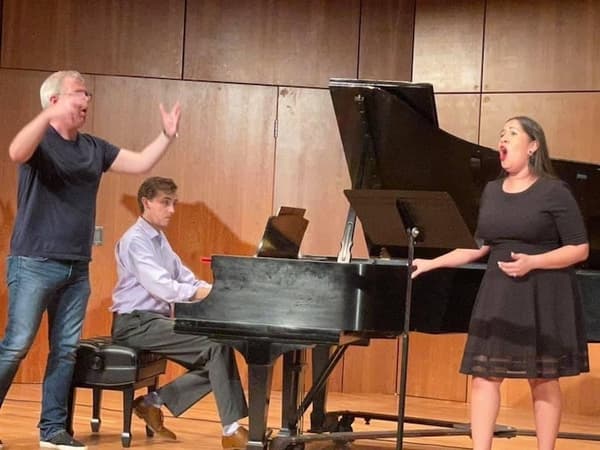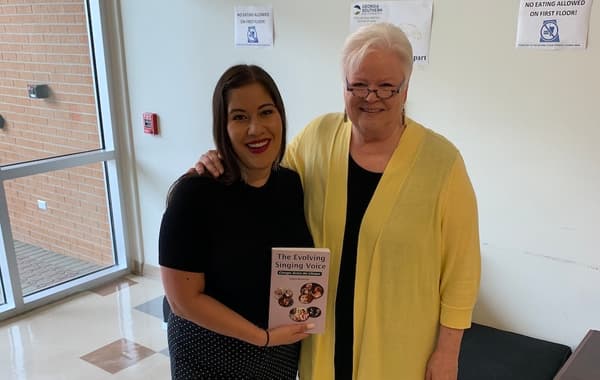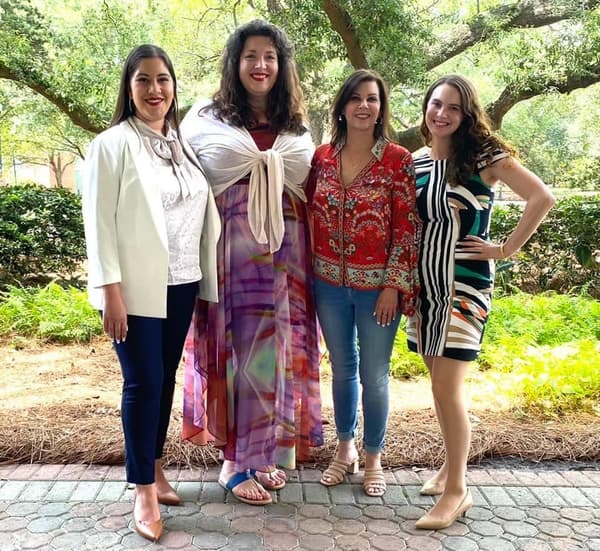Dr. Liliana Guerrero, director of vocal studies and assistant professor, is among a select group of music faculty across the nation recently chosen to participate in the National Association of Teachers of Singing (NATS) Intern Program.
With more than 7,000 members across the country, the intern program only selects a few hundred applicants to join the association for an exceptional training experience that seeks to pair expert and recognized master teachers with talented early career members of NATS.
According to NATS, participants are given the opportunity to explore their craft in an intensive format designed to promote the dynamic exchange of ideas and techniques, the goal is to improve substantially the studio teaching skills of voice interns and the coaching skills of collaborative piano interns.
This June, Dr. Guerrero traveled to Georgia Southern University and spent each morning teaching in front of a master teacher. There, she had the honor of working with Kari Ragan, who Dr. Guerrero says is changing the way vocals are taught in the university environment with her new book, “A Systematic Approach to the Voice.”

While there, she also had the chance to hear from a variety of master teachers, a vocal literature liaison, and selected guests who presented special lectures and demonstrations. The voice master teachers typically include collegiate and independent studio teachers who specialize in “classical” singing, in “non-classical” styles, and who have experience in the needs of the private studio.
“I was incredibly excited to be selected as a 2021 NATS Intern since in the field of voice, it is regarded as one of the highest honors a budding voice teacher can receive,” Dr. Guerrero said. “The program was grueling yet rewarding. My master teacher would give me pointers on how to improve my teaching, and then other members of my cohort would take turns teaching. It was a wonderful way to share ideas and troubleshoot difficult pedagogical concepts.”
In the afternoons, the group took turns presenting their research, listening to lectures from master teachers, learning about new vocal repertoire to take back to students, and singing in master class and coaching. At the end of the week, their students gave a recital of the repertoire Dr. Guerrero and her colleagues had worked on with them and she says it was an absolute joy to watch them come into their own artistry and an experience that changed her life for the better.

She is also planning for another experience in late June when she will join the Cleveland Institute of Music’s Future of Music Faculty Fellowship. Hosted by the Sphinx Venture Fund, the fellowship seeks to elevate Black and Latinx educators within the music academy through a groundbreaking career development for initiative for music professionals considering and/or currently pursuing an academic career.
As part of a select group of only 35 fellows, Dr. Guerrero will be part of one of the most competitive fellowship spotlights in the country where future faculty leaders can elevate empower themselves to influence generations of musicians.
In addition to virtual events featuring some of the most influential teachers and artists within the field, the program will also host keynotes by internationally acclaimed musicians, composers, and educators like Wynton Marsalis, resilience researcher Dr. Angela Duckworth, national leader in higher education Dr. Ronald Crutcher and leadership expert Simon Sinek. According to the CIM, there will also be representatives from The Juilliard School to the University of Richmond to the Heifetz Institute.
Dr. Guerrero is particularly looking forward to this opportunity since she says faculty of color face unique challenges in higher education and this fellowship will forward provide a unique space where she and other selected faculty can be mentored by and learn from prominent thinkers in their field who look like them. She was also fortunate to be a 2019-2020 New York University Faculty First Look Scholar—a similar program where Ph.D. candidates were invited to be trained to enter academia.
“While there, they taught us about negotiating job offers, applying for jobs, and mentoring students of color who will look to us as they navigate college,” she said. “I see the Future of Music Faculty Fellowship Program as an extension of what I learned at NYU, but this program focuses specifically on work in the music field. It’s important for students to have role models who look like them so that they can feel comfortable enough to be their authentic selves.”
She says it’s also important for faculty of color to take care of themselves and this type of fellowship will offer advice and strategies on how to do that.
“We get asked to do a lot of extra work around dialogue facilitation, anti-racist work, and social justice,” she said. “This work is my secondary passion to music, so I love doing it, but I have to be careful not to overextend myself. Faculty of color have unique challenges in academia, and I look forward to learning how to navigate these challenges from seasoned mentors.”
One of her main objectives when she began her role at TLU was to bring national recognition to the music program, acknowledging the outstanding work of her colleagues, School Of Music and Choir Director Dr. Doug Boyer, Band Director Beth Bronk, and Orchestra Director Dr. Eliza Jeffords.
“They give so much to the students here at TLU and the world needs to know about what a great program we have,” she said. “I brought some students with me to the Texoma NATS Virtual Conference in the Fall, and they fit right in with the other student competitors in terms of ability level. I am excited to see where we can go from here. We re-started the Opera/Music Theatre Workshop course this Spring and the students worked hard on videos that we'll be submitting to the National Opera Association Opera Scenes Competition."

For Dr. Guerrero, this opportunity with the CIM is even more special given the personal connection she feels, as well as being incredibly proud to have the honor of molding the minds of young Latinx first-generation students at an officially designated Hispanic Serving Institution like TLU.
“I am a daughter of immigrants and was the first in my family to get a college degree. I see myself in my students and take my responsibility very seriously,” she said. “Latinas make up a mere 2 percent of all terminal degree holders. During my interview at TLU I had a student come up to me and say, ‘I really hope you get this job. I've never had a teacher who looked like me before.’ I knew that feeling. I’m passionate about lifting others up while I continue to climb. The old phrase of ‘you can't be what you can't see’ doesn't apply here, because I believe representation matters, and I am here to show my students that a young Latina from an immigrant family can grow up to achieve her ancestor's wildest dreams. I may have been one of the first to the top of the mountain, but it's my mission to make sure I'm not the last.”
